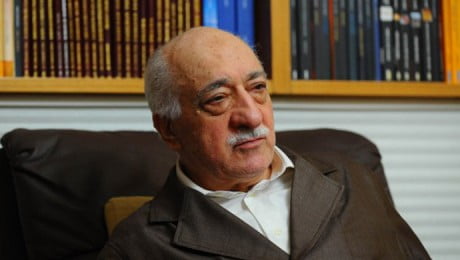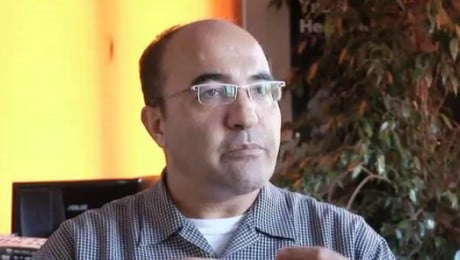Keyword: Fethullah Gulen

Turkish Scholar Fethullah Gulen Speaks about PKK [terrorist organization]
Fethullah Gulen, Turkish scholar: “We were never completely aligned with any political party. But on the Kurdish issue, we were supporting the peace process before the government.” The Hizmet or service movement, through civil service initiatives, has been active in the region. It has focused on education, healthcare and religious affairs.

U.S.-based Turkish cleric says used as scapegoat in graft scandal
REUTERS U.S.-based Turkish cleric Fethullah Gulen has denied giving orders to police and prosecutors in a corruption inquiry rocking the government, saying his worldwide movement of followers was being used as a scapegoat to divert attention. In his first TV interview in 16 years, the influential preacher told the BBC that Prime Minister Tayyip Erdogan […]

Gülen extends condolences to MHP over official’s death
Prominent Islamic scholar Fethullah Gülen, who also inspired the faith-based Hizmet movement, issued a message of condolence to Nationalist Movement Party (MHP) officials regarding the death of the party’s media adviser, Cengiz Yücel Akyıldız, who was killed during an attack outside a party office on Sunday.

Islamic scholar Fethullah Gülen gives first TV interview in 16 years
Responding to widespread assumptions that he ordered his followers in senior positions in the police and judiciary to launch the investigations into alleged high-level government corruption, Gülen issued strong denials of such claims. He said the reactions of the ruling Justice and Development Party (AKP), which have included the sacking a number of police commissioners and the arrest of some of Erdoğan’s allies, were “anti-democratic.”

Analysis: Power of Turkey’s Fethullah Gulen
PM Erdogan accuses Hizmet supporters within the state of plotting a “coup” against the government. But the scale of the upheaval in the police, judiciary, Turkish state TV and other parts of the bureaucracy is already similar to what happens in a coup. The current Erdogan-Gulen stand-off is reminiscent of Mustafa Kemal Ataturk’s hostile relations with Said-i Nursi, a politically active Kurdish preacher in the formative years of the Turkish Republic.

BBC Interviews Fethullah Gulen (Powerful but reclusive Turkish cleric)
Tim Franks – BBC Newshour, Pennsylvania – Speaking to the BBC’s Newshour, Fethullah Gulen said: “It is not possible for these judges and prosecutors to receive orders from me.” – Fethullah Gulen has been called Turkey’s second most powerful man. He is also a recluse, who lives in self-imposed exile in the US. – But now, […]

Powerful but reclusive Turkish cleric (BBC Interviews Fethullah Gulen)
Speaking to the BBC’s Newshour, Fethullah Gulen said: “It is not possible for these judges and prosecutors to receive orders from me.” Fethullah Gulen has been called Turkey’s second most powerful man. He is also a recluse, who lives in self-imposed exile in the US.

Gulen Movement, civilian governments and the AK Party
The Gulen movement’s understanding of politics and the political process differentiate it from the military and bureaucratic elite. Its main political objective is to transform society by raising the moral consciousness of individuals. By raising moral consciousness, the movement hopes to cleanse the bureaucracy of widespread corruption, increase the efficiency and transparency of state institutions, reinvigorate public work ethic to serve the people in order to enhance the legitimacy of the state, and create opportunity spaces for marginalized sectors of the Anatolian population.

Turkish people upset that democratic progress is being reversed: Islamic scholar Gülen
The Turkish people are upset that democratic progress has gone into reverse over the last two years, Islamic scholar Fethullah Gülen has said, speaking in his first interview since the graft probes that have damaged the government and widened the rift between his movement and the ruling Justice and Development Party (AKP).

Fethullah Gulen’s interview with The Wall Street Journal
A broad spectrum of Turkish people, including Hizmet participants, supported AKP for democratizing reforms, for ending the military tutelage over politics and for moving Turkey forward in the EU accession process. We have always supported what we believed to be right and in line with democratic principles. But we have also criticized what we saw as wrong and contrary to those principles.

Turkish PM heads to Brussels for tough talks with EU
Although the prime minister argues that an ongoing corruption and graft probe engulfing his own ministers is simply a plot hatched by an “illegal gang” that he describes as “parallel state” operated by Fethullah Gülen, a cleric in self-exile in the U.S., EU officials have made clear that such rhetoric has not been bought in Brussels.

Turkish authorities purge regulators, state TV employees in backlash against graft probe
Turkey has extended a purge of official organizations to the banking and telecommunications regulators and state television, firing dozens of executives in moves that appear to broaden Prime Minister Recep Tayyip Erdogan’s push back against a corruption investigation.

Gülen’s Dialogue on Education: A Caravanserai of Ideas
Professor Tom Gage portrays eight modern educators and the development of their theories viewed from personal, cultural, and historical perspectives. He links their ideas to those of Fethullah Gülen, a highly influential educator of today who draws on an entirely different tradition.

Major reshuffle in Turkish judiciary amid graft probe row
Çolakkadı, Öz, Seçen and Kansız are prosecutors who had overseen a number of probes and court cases such as Ergenekon, Balyoz and KCK between 2007-2012 against alleged coup attempts by groups within the military and outlawed Kurdish organizations during the time when Erdoğan favored the support of Gülen, who allegedly has sympathizers particularly in the judiciary and the police force.


















